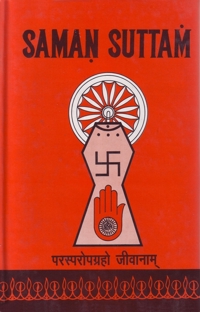09. Dharma Sutra
PRECEPTS ON RELIGION
Dhammo mangalamukkittham, ahimsa samjamo tavo.
Deva vi tam namamsanti, jassa dhamme saya mano. (82)Religion is supremely auspicious; non-violence, selfcontrol and p[enance are its essentials. Even the gods bow down before him whose mind is ever preoccupied with religion. (82)
Dhammo vatthu sahavo, khamadibhavo ya dasaviho dhammo.
Rayanattayam ca dhammo, jivanam rakkhanam dhammo. (83)The essential nature of a thing is called dharma. The ten virtues, i.e. forgiveness etc., are the ten forms of dharma. The three jewels, i.e. right faith, right knowledge and right conduct, constitute the dharma (religion). To render protection to the living being is also called dharma. (83)
Uttamakhamamaddavajjava-saccasauccam ca samjamam ceva.
Tavacagamakimcanham, bamha idi dasaviho dhammo. (84)Supreme forgiveness, supreme humility, supreme straightforwardness; supreme truthfulness, supreme purity, supreme self-restraint, supreme penance, supreme renunciation, supreme non-possessiveness and supreme celibacy, these constitute the ten-fold Religion. (84)
Kohena jo na tappadi, sura-nara-tiriehi kiramane vi.
Uvasagge vi raudde, tassa khama nimmala hodi. (85)He who does not become excited with anger even when terrible afflictions are caused to him by gods, human beings and beasts, his forbearance is perfect. (85) Khammami savvajivanam, savve jiva khamamtu me.
Mittu me savvabhudesu, veram majjaham na kena vi. (86)I forgive all living beings and may all living beings forgive me; I cherish feelings of friendship towards all and I harbour enmity towards none. (86)
Jai kimci pamaenam, na sutthu bhe vattiyam mae puvvim.
Tam me khamemi aham, nissallo nikkasao a. (87)If I have behaved towards you in the past in an improper manner due to slight inadvertance, I sincerely beg your pardon, with a pure heart (i.e. without any sting and passion). (87)
Kularuvajadibuddhisu, tavasudasilesu garvam kimci.
Jo navi kuvvadi samano, maddavadhammam have tassa. (88)A monk who doesnot boast even slightly of his family, handsomeness, caste, learning, penance, scriptural knowledge and character observes the religion of humility. (88)
Jo avamanakaranam, dosam pariharai niccamautto.
So nama hodi nami, na du gunacattena manena. (89)He alone is really worthy of proud who is careful not to insult other people. A person who merely boasts, has no virtues, cannot command respect. (89)
Se asaim uccagoe asaim niagoe, no hine no airitte.
No pihae iti samkhae, ke goyavai ke manvai? (90)Every one has born several times in high families as well as in low families;l hence none is either high or low. After knowing this, who will feel proud of taking birth in respectable or high family? (90)
Jo cintei na vamkam, na kunadi vamkam na jampade vamkam.
Na ya govadi niyadosam, ajjava-dhammo have tasst. (91)He who does not think crookedly, does not act crookedly, does not speak crookedly and does not hide his own weaknesses, observes the virtue of straightforwardness. (91)
parasamtavayakarana-vayanam, mottuna saparahidavayanam.
Jo vadadi Bhikkhu turiyo tasst du dhammo have saccam. (92)A monk who avoids all speech that is likely to hurt others and speaks only what is good to himself and to others observes the fourth virtue of truthfulness. (92)
Mosassa paccha ya puratthao yha, paogakale ya duhi durante.
Evam adattani samayayanto, ruve atitto duhio anisso. (93)A person suffers misery after telling a lie, before telling a lie and while telling a lie; thus suffers endless misery, similarly a person who steels or a person who is lustful also suffers misery and finds himself without support. (93)
Pattham hidayanittham pi, bhannamanassa saganavasissa.
kadugam va osaham tam, mahuravivayam havai tassa. (94)Every beneficial advice given by a group-fellow though unpalatable to the mind at first, proves wholesome in the end, like a medicine which is better in taste becomes agreeable in effect. (94)
Vissasanijjo maya va, hoi pujjo guru vva loass.
Sayanu vva saccavai, puriso savvassa hoi pio. (95)A person who speaks the truth becomes trustworthy like a mother, venerable like a preceptor to his people and dear to all others as their relatives. (95)
Saccammi vasadi tavo, saccammi samjamo taha vase sesa vi guna.
Saccam nibandhanam hi ya, gunanamudadhiva macchanam. (96)Truthfulness is the abode of penance, of self-control and of all other virtues; indeed truthfulness is the place of origination of all other noble qualities as the ocean is that of fishes. (96)
Jaha laho taha loho, laha loho pavaddhai.
Domasakayam kajjam, kodie vi na nitthiyam. (97)Greed grows with every gain, every gain increases greed. A work which could be done by two grams of gold, could not be done even by crores of grams. (97)
Suvannaruppassa u pavvaya bhave, siya hu kelasasama asamkhaya.
Narassa liddhassa na tehi kimci, iccha hu agasasama anantiya. (98)Even if a greedy person comes to accumulate a numberless Kailasa-like mountains of gold and silver they mean nothing to him, for this desire is as endless as is the sky. (98)
Jha ya andappabhava balaga, andam balagappabhavam jaha ya.
Emeva mohayayanam khu tanha, moham ca tanhayayanam vayanti. (99)Just as a she-crane is born of an egg and an egg is born of a she-crane, soalso delusion is born of craving and craving is born of dulusion. (99)
Samasamtosajalenam, jo dhovadi tivva-lohamala-punjam.
Bhoyana-giddhi-vihino, tassa sauccam have vimalam. (100)One who washes away the dirty heap of greed with the water of equannimity and contentment and is free from lust for food, will attain perfect purity. (100)
Vaya-samidi-kasayanam, dandanam taha imdiyana pancanham.
Dharana-palana-niggaha-caya-jao samjamo bhanio. (101)Self-restraint consists of the keeping of five vows, observance of five rules of carefulness (samiti) subjugation of (four) passions, controlling all activities of mind, speech and body, and victory over the senses. (101)
Visayakasaya-viniggahabhavam, kauna jhanasajjhae,
Jo bhavai appanam, tassa tavam hodi niyamena. (102)Penance consists in concentration on the self by meditation, study of the scripture and restraining the senses and passions. (102)
Nivvedatiyam bhavai, moham caiuna savvadavvesu.
Jo tassa have cago, idi bhanidam jinavrindehim. (103)Supreme Jina has said that true renunciation consists in developing indifference towards the three, namely the world, the body and the enjoyment, through detachment for material objects. (103)
Jeya kante pie bhoe, laddhe vipitthikuvvai.
Sahine cayai bhoe, se hu cai tti vuccai. (104)He alone can be said to have truly renounced everything who has turened his back on all availble, beloved and dear objects of enjoyment possessed by him. (104)
Houna ya nissamgo, niyabhavan niggahittu suhaduhadam.
Niddamdena du vattadi, anayaro tassa kicannam. (105)That monk alone acquires the virtue of nonpossessiveness, who renouncing the sense of ownership and attachment and controlling his own thoughts, remains unperturbed by the pair of oppiness and misery. (105)
Ahamikko khalu suddho, damsanananamaio sada ruvi.
Na vi atthi majjha kimci vi, annam paramanumittam pi. (106)Verily I am alone, pure, eternal and formless and possessing the qualities of apprehension and comprehension except these is nothing, not even an atom, that is my own. (106)
Suham vasamo jivamo, jesim no natthi kimcana.
Mihilae dajjhamanie, na me dajjhai kimcana.
Cattaputtakalattassa, nivvavarassa bhikkhuno.
Piyam na vijjai kimci appiyam pi na vijjae. (107 & 108)We, who have nothing of our own, reside happily and live happily. As Nami who had renounced his kingdom and become a saint, said when Mithila was in flames nothing of mine is being burnt there. I have abandoned my children and my wife, I have no occupation; I am a mendicant; there is nothing dear or disareeable to me. (107 & 108)
Jaha pommam jale jayam, novalippai varina.
Evam alittam kamehim, tam vayam buma mahanam. (109)We call him a Brahmin who remains unaffected by objects of sensual pleasures like a lotus which remains untouched by water though born in it. (109)
Dukkham hayam jassa na hoi moho, moho hao jass ana hoi tanha.
Tanha haya jassa na hoi loho, loho hao jass ana kimcanaim. (110)He who has got rid of delusion has his misery destroyed, he who has got rid of craving has his delusion destroyed. He who has got rid of greed has his craving destroyed, he who owns nothing has his greed destroyed. (110)
Jivo bambha jivammi, ceva cariya havijja ja jadino.
Tam jana bambhaceram, vimukkaparadehatittisa. (111)The soul verily is Brahman, so the activity regarding the self of a monk-who refrains himself from seeking enjoyment through other.s body (i. e. sexual enjoyment), is called Brahmacarya (celibacy).(111)
Savvamagam pecchanto, itthinam tasu muyadi dubbhavam.
So bamhacerabhavam, sukkadi khalu duddharam dharadi. (112)He observes the most difficult but pious virtue of celibacy, who does not entertain evil thoughts even after looking at all the organs of woman. (112)
Jaukumbhe joiuvagudhe, asubhitatte nasamuvayai.
Evitthiyahi anagara, samvasena nasamuvayanti. (113)Just as a jar made of lac (sealing wax) when placed near fire soon gets melted and perished. Similarly a monk who moves in the company of women looses his character. (113)
Ee ya samge samikkamitta, suduttara ceva bhavanti sesa.
Jaha mahasagaramuttaritta, nai bhave avi gamgasamana. (114)One, who overcomes desires for association with women, can overcome other temptations of his life as easily as a person, who has crossed an ocean, can easily cross the river Ganges. (114)
Jaha silarakkhayanam, purisanam nindidao mahilao.
Taha silarakkhayanam, mahilanam nindida purisa. (115)Just as women become censurable by men observing calibacy, similarly men become censurable by women observing celibacy. (115)
Kim puna gunsahidao, ithio atthi vitthadajasao.
Naralogadevadao, devehim vi vandanijjao. (116)But there are women endowed with stern character, renowned far and wide, who are goddesses on this earth and are even adorned by gods. (116)
Tellokkadavidahano, kamaggi visayarukkhapajjalio.
Jovvanatanillacari, jam na dahai so havai dhanno. (117)The sexual fire fed by the trees of desires can burn the forest of the three world, one is blessed whose grass of youthful life remains unburnt by this fire. (117)
Ja ja vajjai rayani, na sa padiniyattai.
Ahammam kunamanssa, aphala janti raio. (118)The nights that pass away cannot return back. The night of a person engaged in sinful activities, go waste. (118)
Jaha ya tinni vaniya, mulam ghettauna niggaya.
Egottha lahai laham, ego mulena agao.
Ego mulam pi haritta, agao tatha vanio.
Vavahare uvama esa, evam dhamme viyanaha. (119 &120)Three Merchants started (on business) with their capital; one of them made profit in his business; the other returned back with his capital only; the third one returned after losing all the capital that he had taken with him. Know that in practice, this simile is also applicable in religious matter. (119 & 120)
Appa janai appa, jahatthio appasakkhio dhammo.
appa kareim tam taha appasuhavao hoi. (121)The soul verily knows himself. Really one.s soul itself is the witness of religiousity, hence he performs religious activity in such a manner as brings satisfaction to himself. (121)
 Jinendra Varni
Jinendra Varni

